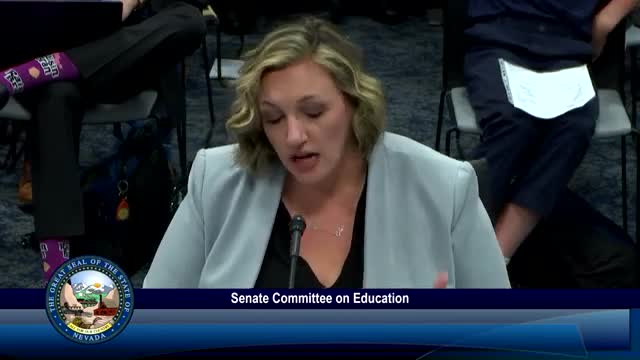Nevada Senate proposes changes to Clark County education funding model
May 19, 2025 | 2025 Legislature NV, Nevada
This article was created by AI summarizing key points discussed. AI makes mistakes, so for full details and context, please refer to the video of the full meeting. Please report any errors so we can fix them. Report an error »

The Nevada Senate Committee on Education convened on May 19, 2025, to discuss significant funding and structural reforms aimed at improving the state's education system. Central to the meeting was a proposed amendment to broaden eligibility for $10 million in facilities funding, allowing charter schools and nonprofit organizations to access these resources. This move is part of a broader strategy to create more pre-kindergarten spots and enhance educational opportunities for all children in Nevada.
The committee highlighted several appropriations for various educational programs, including the Nevada Ready Pre-K account and the Nevada Registered Teacher Apprenticeship Support account. Notably, the bill also seeks to continue salary increases for teachers, as mandated by previous legislation, ensuring that these funds supplement rather than replace existing resources for public schools.
A significant focus of the discussions was on addressing teacher retention and recruitment, particularly in charter schools. The committee emphasized the importance of providing competitive salaries to attract and retain qualified educators. Data presented during the meeting indicated that recent salary increases have positively impacted teacher vacancies and retention rates across the state, suggesting that financial incentives are effective in maintaining a stable teaching workforce.
The meeting also addressed the challenges faced by the Clark County School District, which has struggled with stagnant student proficiency levels and graduation rates despite a decentralized model implemented in 2017. The proposed amendments aim to shift some control back to the district level, allowing for better management of resources and accountability measures. This includes requiring schools to utilize carryover funds for direct educational purposes rather than allowing them to accumulate unspent budgets.
The committee's discussions underscored a commitment to reforming the educational landscape in Nevada, with a focus on ensuring that all students receive a quality education. The proposed changes reflect a recognition that previous models have not yielded the desired outcomes, prompting a reevaluation of strategies to enhance student achievement.
In conclusion, the Senate Committee on Education's meeting highlighted critical funding initiatives and structural reforms aimed at improving educational outcomes in Nevada. As the committee moves forward, the anticipated changes could reshape the state's approach to education, ensuring that resources are effectively utilized to benefit all students.
The committee highlighted several appropriations for various educational programs, including the Nevada Ready Pre-K account and the Nevada Registered Teacher Apprenticeship Support account. Notably, the bill also seeks to continue salary increases for teachers, as mandated by previous legislation, ensuring that these funds supplement rather than replace existing resources for public schools.
A significant focus of the discussions was on addressing teacher retention and recruitment, particularly in charter schools. The committee emphasized the importance of providing competitive salaries to attract and retain qualified educators. Data presented during the meeting indicated that recent salary increases have positively impacted teacher vacancies and retention rates across the state, suggesting that financial incentives are effective in maintaining a stable teaching workforce.
The meeting also addressed the challenges faced by the Clark County School District, which has struggled with stagnant student proficiency levels and graduation rates despite a decentralized model implemented in 2017. The proposed amendments aim to shift some control back to the district level, allowing for better management of resources and accountability measures. This includes requiring schools to utilize carryover funds for direct educational purposes rather than allowing them to accumulate unspent budgets.
The committee's discussions underscored a commitment to reforming the educational landscape in Nevada, with a focus on ensuring that all students receive a quality education. The proposed changes reflect a recognition that previous models have not yielded the desired outcomes, prompting a reevaluation of strategies to enhance student achievement.
In conclusion, the Senate Committee on Education's meeting highlighted critical funding initiatives and structural reforms aimed at improving educational outcomes in Nevada. As the committee moves forward, the anticipated changes could reshape the state's approach to education, ensuring that resources are effectively utilized to benefit all students.
View full meeting
This article is based on a recent meeting—watch the full video and explore the complete transcript for deeper insights into the discussion.
View full meeting